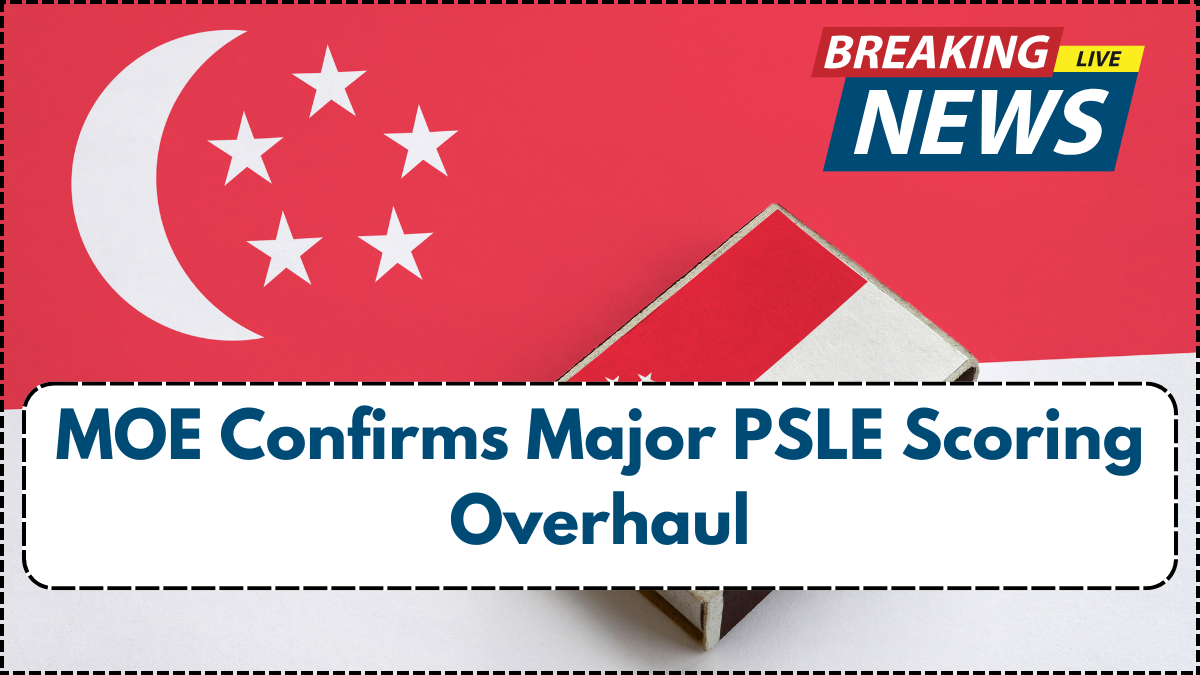Singapore’s Ministry of Education (MOE) officially confirmed significant adjustments to the Primary School Leaving Examination (PSLE) scoring system. These MOE PSLE scoring changes aim to enhance fairness, reduce pressure on students, and better align assessment with holistic education values. The revised framework marks a pivotal moment for parents, educators, and primary school pupils across the nation.

Breakdown of the New PSLE Scoring System
The PSLE will continue using Achievement Levels (ALs), but the new scoring model further redefines how student performance is interpreted. Instead of emphasizing narrow academic distinctions, the revised scheme simplifies score interpretation and encourages balanced development.
| Component | Previous System | New System (2025) |
|---|---|---|
| Scoring Range | AL1 to AL8 per subject | Maintains AL1–AL8 but weights adjusted |
| Aggregate Score | Sum of four ALs (4–32 range) | Modified scaling with soft bands |
| Secondary Placement | T-Score conversion used | Direct AL-based posting |
| Subject Weighting | Equal weighting | Flexibility in subject strength |
This revised framework promotes a strengths-based approach, reducing the overemphasis on a perfect score and shifting attention toward subject mastery and personal growth.
What’s Changing in School Placement and Student Assessment
One major highlight of the MOE PSLE scoring changes is the removal of rigid cut-off points for school admissions. Instead of a hard ranking system, students with the same AL scores will now be considered equally for school posting. This approach is designed to lessen the academic rat race and allow students to explore interests beyond the classroom.
To complement this, schools are being encouraged to adopt a more diversified approach to student development. Holistic programs, co-curricular achievements, and character-building efforts are now being acknowledged alongside academic results.
Why These Changes Matter: Easing Stress and Broadening Horizons
Parents have long voiced concerns over the immense pressure their children face during the PSLE. In response, the MOE’s latest scoring reform is a strategic move to realign academic performance with personal development and lifelong learning. The MOE PSLE scoring changes are not just technical tweaks—they signal a cultural shift.
By de-emphasizing the importance of a narrow band of scores, the new framework helps students develop confidence in a wider range of subjects. This allows for a more authentic and enriching educational experience, especially for students who may excel in non-traditional disciplines.
What Parents Should Do Now
With these changes taking effect for students sitting the PSLE in 2025, parents need to update their expectations and strategies:
- Familiarize with the new AL bands and how they affect school choices.
- Guide children in identifying their strengths across subjects.
- Encourage balanced schedules that include time for co-curricular activities.
- Communicate with schools for updates on assessment and guidance support.
The PSLE is no longer about chasing perfection but about nurturing resilience, adaptability, and self-awareness.
Conclusion: A Step Toward Smarter Education
The MOE PSLE scoring changes rolled out in June 2025 signal a new era in Singapore’s education journey. These reforms are more than a policy update—they are an invitation to rethink success and rediscover purpose in education. With the system now prioritizing growth over grades, students have a more meaningful chance to thrive.
FAQs
What are the main changes in the 2025 MOE PSLE scoring system?
The 2025 changes maintain the AL system but adjust weightings, eliminate the T-score, and introduce equal consideration for students with identical scores during secondary school posting.
How will school admissions work under the new system?
Secondary school admissions will be based on broader AL bands, with tie-breakers only when necessary. Co-curricular and non-academic aspects are given more consideration.
Will this reduce the academic stress on students?
Yes. The revised system is intended to lower pressure by encouraging well-rounded development rather than purely academic excellence.
Is the PSLE still important under the new scoring model?
Absolutely. While the pressure may be eased, the PSLE still plays a crucial role in determining suitable educational pathways.
How should parents prepare their children?
Parents should focus on cultivating a love for learning, helping kids explore diverse interests, and supporting them in understanding their strengths.
For More Information Click Here



